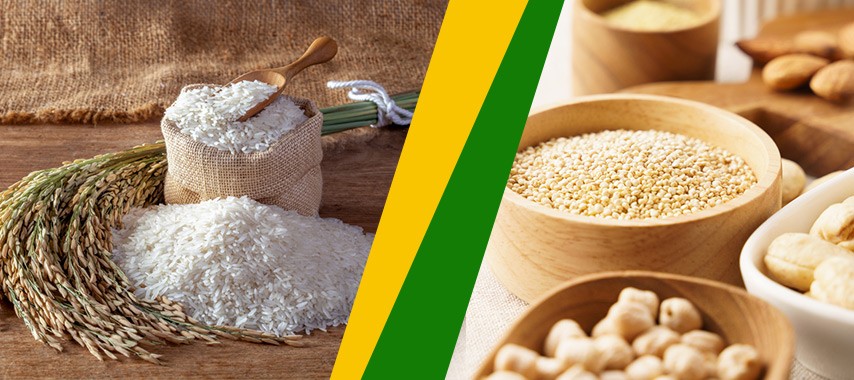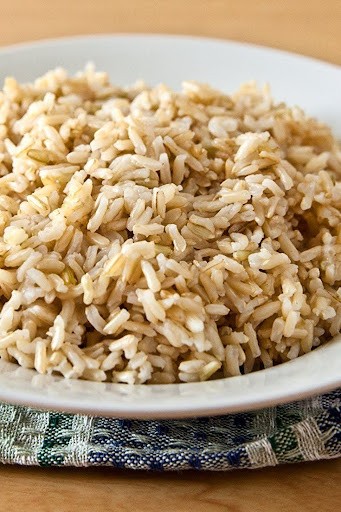

Published on Feb 19th, 2024

In the constantly evolving world of fitness and nutrition, searching for the finest protein source can feel like chasing a unicorn. Guess what's been all the rage lately regarding plant-based proteins? Protein from rice! Peeling back the layers, let's stroll around the protein jungle and discover what makes rice protein unique.
Here's the thing: don't worry; we won't get too technical as we go into the specifics of protein. We want to spill the tea onto the protein found in rice. We understand that rice protein is a bit of a mystery. But why are fitness people giving rice protein such high fives? We're going to find out the unique selling points of it. This blog will reveal why rice protein could become your new best friend.
Now discuss rice protein and magic in plant-based proteins. This stuff isn't messing around—it comes straight from the typical brown rice grain. Unlike other plant proteins that could be a little picky about the amino acids they bring, it has a reputation for being a complete protein. What is meant by "complete"? It's packed with all essential amino acids, the VIPs of bodily functions. Think of it as a champion for overall cellular health, a superhero for the immune system, and a wizard for muscle restoration.
The widespread availability of rice protein is one of its most notable qualities. It is a blessing for those who are lactose intolerant, offering an option to conventional dairy-based protein sources such as whey. Furthermore, rice protein provides a safe harbor for those suffering from allergies, particularly those linked to dairy or soy. Because of its hypoallergenic qualities, it is a flexible alternative for people looking for protein sources that comply with particular dietary guidelines. Furthermore, because it is a plant-based protein, it appeals to people adopting vegetarian or vegan diets, encouraging morally and environmentally responsible food choices.
Rice protein has fast absorption kinetics and is a valuable supplement sometimes overlooked in the fitness category. Even while it doesn't have the same rapid absorption as other proteins, such as whey protein, it provides a consistent release of amino acids, which aids in long-term recovery following exercise. To meet athletes' endurance and sustained energy requirements, the slower rate of digestion is consistent with the idea of a more gradual and protracted nutrient delivery.
Regarding plant-based protein, soy protein is competitive and is frequently praised for being as complete as protein from animal sources. But the simplicity and hypoallergenic qualities of rice protein make it unique. Rice protein is a mild but adequate substitute without sacrificing necessary amino acids for soy-sensitive people or looking for a simpler source of protein.
On the nutritional stage, pea protein assumes a position of prominence. It contributes an abundance of arginine and lysine, which perfectly harmonize with rice protein. These two powerful amino acid combinations produce a symphony of essential building blocks critical for maintaining healthy muscles and general well-being. Together, the proteins found in rice and peas can create a protein intake approach that is both balanced and synergistic.
Rice protein balances this out with its ease of use and adaptability, while hemp protein excels in certain areas. The complete amino acid profile of rice protein and the high nutritional content of hemp protein can be combined to create a well-rounded protein source that supports digestive and cardiovascular health and provides muscular assistance.

To delve deeper into the world of macronutrients, let's examine the protein content per serving of rice protein with other proteins. Rice protein is a vital substitute for whey, which has long been the industry leader in protein content. Despite being unique, rice protein's content makes a significant contribution—especially for people looking for plant-based alternatives
Compared to animal sources in completeness, soy protein is a strong rival. At the same time, hemp protein offers a different nutritional tango with its omega-3 fatty acids and fiber, pea protein steps in with its distinct richness in amino acids.
The unsung heroes of the nutritional tale are the amino acid profiles, which go beyond the simple protein counts. Rice protein, sometimes undervalued, contains all necessary amino acids, making it a complete protein source. The interaction between amino acids becomes crucial when thinking about a balanced intake. Rice protein disrupts the status quo with its comprehensive amino acid composition, while whey protein is well-known for its high BCAA profile. The harmonious combination of amino acids in rice protein supports general body processes and muscle growth and repair.
Let's examine the ecological footprint of our protein sources as we take a contemplative walk through the environmental garden. Rice protein shows great promise in terms of sustainability. Rice protein is less harmful to the environment than animal-based proteins, which need a lot of resources. Compared to products obtained from animals, its cultivation often takes less land, water, and energy, which lessens the impact on the environment. Choosing rice protein is a deliberate decision to be environmentally conscious, recognizing the significance of sustainable practices in our food choices.
The decisions we make on our plates impact the entire Earth. As our understanding of environmental issues expands, choosing sustainable protein sources becomes increasingly important. It's a wake-up call for all of us to take care of our planet, knowing that our foods can alleviate or lessen environmental stress. Accepting sustainable protein sources, such as rice protein, helps us make the world healthier by reducing the demand for natural resources and promoting a more peaceful coexistence of the Earth's health and human needs.
A popular plant-based nutritional substitute, rice protein is increasingly in customer demand. Although plant-based proteins offer many possibilities, USA rice protein is still a good option. This means people can customize their protein consumption to meet their nutritional demands and fitness objectives. In this customs-driven age, knowing the unique qualities of rice protein and alternatives helps you choose proteins that support environmental responsibility while aligning with your health goals. To become a healthy version of yourself and the planet, be informed, make thoughtful decisions, and lead the way.
BackBe the first to know about new products, events and offers.